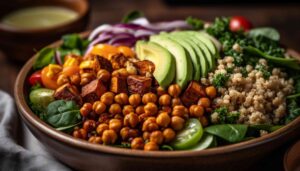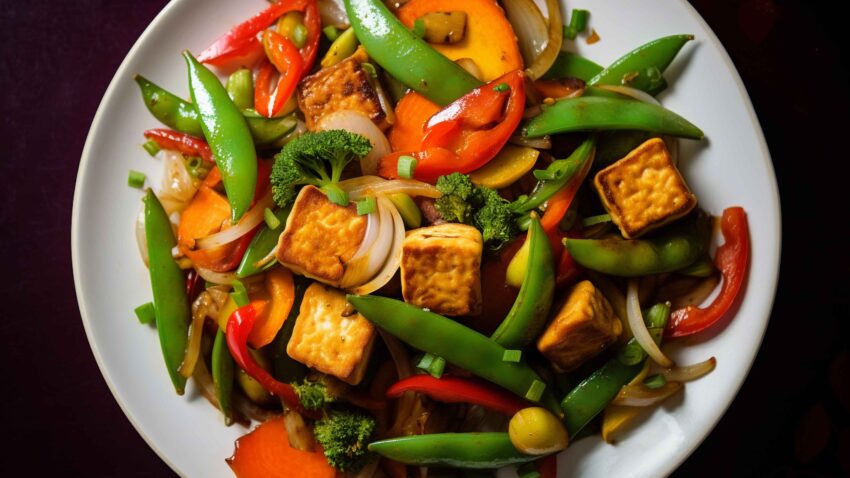Vegetarian foods are taking a storm in the nutrition world, due to the health trend perspective and being versatile. No matter if you are a full-fledged vegetarian or vegan, just looking for alternatives to more meat-free meals.
Here we mentioned nutrition-dense, Easiest, and quickest 10 vegetarian foods to prepare as well as nutritional facts of these 10 vegetarian foods supporting overall health. Include them in your meals every day to ensure you are getting all the vitamins, minerals, and other nutrients.
Top 10 Healthy + Cheap Vegetarian Foods of Nature Enriched in Nutrition
-
Quinoa: Protein-Enriched Grain
A superfood, quinoa serves as a protein-packed grain that is incredibly versatile and can be used in a variety of dishes. Quinoa is not only a source of plant-based protein, but it also contains all nine essential amino acids necessary to maintain life. It is also high in fiber, magnesium, B vitamins iron, and phosphorus.
Eat it: Use quinoa as a salad base, stuff it into peppers, or in place of oats for a warm breakfast porridge. Cook it with water, and vegetable soup, and toss in all your favorite fresh veggies nuts & light dressing for a salad.
-
Sweet potatoes: The nutrient-dense root
Choose a sweet potato for taste and health They contain beta-carotene which the body converts to vitamin A, an important antioxidant for ocular(eyes) health and immunity. One major benefit is that they are an excellent source of dietary fiber, vitamin C, and potassium.
How to eat them: They can be boiled, roasted, mashed, or turned into fries. Another simple and delicious way to enjoy them is to drizzle with olive oil and sprinkle some salt (and whatever spices you desire) before roasting them in the oven.
-
Spinach: The leafy green powerhouse vegetarian food
Spinach: A well-known vegetarian food packed with iron, making it an excellent choice for those who follow a vegetarian diet. It is also rich in vitamins A, C, and K as well as folate, lutein, and zeaxanthin; antioxidants beneficial for eye health.
Great Ways to Enjoy: Eat raw in salads, add it into a smoothie, or fried with some garlic as a side dish It can be a good base on soups or as an ingredient to pasta and omelets.
-
Lentils: The High-fiber, Protein legume.
For vegetarians, lentils provide a solid source of plant-based protein. They have high fiber content which helps with weight loss and improves digestion. Lentils give iron, folate, and all the other vitamins & minerals.
What to do with them: Lentils are very versatile. Add them to soups or stews, salads, and veggie burgers. Lentils — either green, red, or any other variety can also be used in Curries and Harissa.
-
Power Your Day with “Chickpeas”
Chickpeas also known as garbanzo beans are high in protein, fiber, and several important vitamins and minerals like iron, magnesium, and B vitamins They are also an excellent plant-based protein. You can put them to use in many recipes too.
Use it: Roast chickpeas for a snack, purée them into hummus, or add to salads and stews. Try roasting chickpeas in the oven with olive oil, garlic, and whichever herbs you have on hand for a quick bite.

-
The Avocado: Healthy Fats from vegetarian food
Avocados Unknown to many, avocados are technically a fruit that contains healthy monounsaturated fats (dietary fat). that promote heart health and have the powerful ability to reduce bad cholesterol levels. They also contain large amounts of fiber, medium levels of potassium, and vitamins C, E, K, and B6.
Serving Suggestion: Cut up avocados thrown in a salad, mashed into guacamole (dish), or spread on toast. They are also wonderful in smoothies — they make the texture super creamy.
-
Tofu: The Plant-Based Protein
Tofu is an awesome source of protein and a tasty & versatile vegetarian food. It’s also an amazing source of calcium, iron, and magnesium. Low in calories and a complete protein, Tofu is only 15 on the glycemic index (which means low impact on blood sugar levels).
Ways to Eat: Tofu can be marinated grilled, stir-fried, or spread into soups & salads It can also be added to smoothies or desserts for an additional protein kick.
-
Keep your energy up with “Almonds”.
Almonds are not only rich in essential fats, fiber, protein, magnesium, and vitamin E but also, they packed full of antioxidants that support cell protection from oxidative stress.
How to Eat: Enjoy almonds as a snack or add them to your oatmeal, salads, and baked goods. Another great type of nut butter is almond butter, which becomes more delicious in toast or to put into smoothies.
-
Kale: The Powerhouse vegetarian foods
One of the most nutrient-dense vegetarian foods on Earth is kale. It also serves as a good source of vitamins A, K, C, and B6 with some amount of calcium, potassium, copper, and manganese. Kale Contains Antioxidants, such as beta-carotene and Vitamin C— These have numerous benefits for health.
Serving Suggestions: Kale can be used as part of a salad, sautéed and served as a warm side dish, or tossed into the blender for extra nutrition in your smoothies. Kale chips –Baked kale leaves with olive oil in the oven till crispy for a crunchy snack.
-
The small vegetarian food: Chia Seeds
Chia seeds are tiny but so nutritious. Chia seeds are rich in omega-3 fatty acids, fiber, and protein. Calcium, phosphorus, and magnesium can be found a lot in them as well as they contain a lot of antioxidants and can improve digestive and heart health.
How to Serve: You can serve with yogurt, oatmeal, or salads. They can also be soaked in liquid to create a gel-like texture used in beverages, and are commonly used for making chia pudding.
Including These Vegetarian Foods in Your Diet
You may be surprised to discover exactly how easy these top 10 vegetarian foods are to enjoy and use in your diet. If you are new to vegetarian eating, consider adding one or two of these items to your diet each day.
Recommendation: Purchase quinoa as your grain food, or use lentils instead of meat next time when you make a stew. One of the best ways to increase your nutrient intake without changing too much is adding another serving or two of veggies per meal.
Add a handful of frozen berries in a morning smoothie with some protein powder, and Greek yogurt; Spread avocado on top of the omelets at breakfast; or replace bread with avocado toast.
If your child has a vegetarian diet, some of the pros and cons may include.
Eating vegetarian foods that are full of nutrient-dense can improve the health and function of your heart, support digestion, and reduce the risk for chronic disease.
Vegetarian foods are generally lower in calories and saturated fats so they can help aid weight loss or maintenance, whilst also reducing the risk of obesity. Also, the foods contain high fiber that improves digestion and keeps blood sugar levels in control.
Vegetarian foods are also beneficial for the environment halving CO2 emissions and being cruelty-free. It can be good for you, of course, but also for the planet when you choose these natural vegetarian foods.

